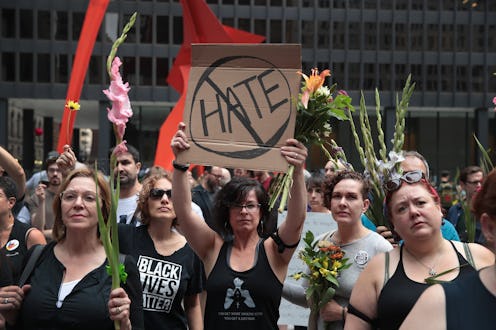News
A Note To Everyone Who Thinks The "Alt-Left" & "Alt-Right" Share Common Traits

During his now infamous press conference Tuesday regarding the events in Charlottesville, Donald Trump said the phrase "alt-left" in reference to counter-protesters who combatted white supremacists at their "Unite the Right" rally. This controversial term isn't the most accurate way to refer to the counter-protesters, because what the "alt-left" wants most is simply for the "alt-right" to disappear.
First of all, let's get one thing straight — there is no such thing as the "alt-left," nor is there any such thing as the "alt-right." The term "alt-right" was created as a way to sanitize the online presence of white supremacists and neo-Nazis, whose digital communities have thrived on platforms such as Twitter and Reddit. The "alt-left" has no such radical ideas as genocide or minority oppression, it simply exists to combat those beliefs and the communities that purport them.
Trump may have been referring to the Antifa movement, some members of which combatted white supremacist protesters in Charlottesville. Antifa stands for anti-fascist, and Antifa participants do have a more radical approach to their activism than more centrist liberals — they generally believe that violence is ok when ideological and societal threats like fascism are threatening people. However, Antifa can't be referred to as "the alt-left" because it's the methods, not the beliefs that makes the movement alternative. Promoting violent racism and combatting violent racism violently are not the same thing, and equalizing them through parallel terms is irresponsible.
So, while understanding that they're not interchangeable, let's use Antifa to replace "alt-left" in this thesis question here: what does Antifa want? That's an impossible question to answer, because the movement isn't centrally structured. One member described Antifa this way to TIME: "The standard for antifa ideology is anti-capitalism, anti-fascism of course. Those are kind of the two main pillars, but within that, encompassed, it also comes with being anti-racism, anti-sexism, anti-ableism, anti-transphobia, anything like that and just protecting people who are marginalized and oppressed.”
But that's just the opinion of one person. Antifa doesn't have a hierarchy or a manifesto, and its members can be as politically diverse as they want — by definition, you don't even have to be a liberal or a Democrat, just strongly opposed enough to fascism to get out there and radically fight against it.
Perhaps the bigger question is what do liberals want? What specific policy changes are people hoping to come from all this turmoil? But this has historically been one of the biggest challenges for left-wing politics in America — it's difficult to get people to agree on concrete terms, and it's even harder to plan when you're in crisis mode, which is the only time these conversations about radical social change seem to come up.
The Antifa movement doesn't advocate for much more than what most people want — to not see public and brazen displays of fascism in the streets. Beyond that, other activists need to come together to figure out exactly what Antifa is fighting for.